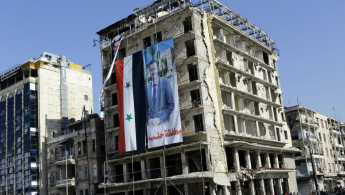Despite Covid-19, Syria regime forces pro-Assad rallies ahead of election
The Syrian regime has continued to mobilise civilians from across the country to participate in marches in support of President Bashar al-Assad ahead of presidential elections next week, despite the Covid-19 pandemic.
Speaking to The New Arab’s Arabic-language service, local sources said Syrians - including students and workers - were being told to gather and show support for Assad, who is running for a fourth presidential term in the election scheduled for May 26.
Regime authorities forced people on Tuesday to march in the main square of Baba Amr in the western city of Homs, and then again on Wednesday organised a student march at a university in the coastal city of Lattakia.
While Lattakia is considered a stronghold of the Baath regime, Baba Amr is known to be an area where strong opposition to Assad’s rule exists.
Fierce fighting between Assad's forces and rebels took place there and in the rest of Homs in 2012, before it was captured by the regime in April 2013.
No Covid-19 precautionary measures were taken, according to the sources, despite the virus being widespread in Syria.
A lack of safety measures was also seen in Lattakia, the sources added, where around a thousand students gathered at the state-run Tishreen University.
The UN and humanitarian organisations warned last month that an accelerating wave of coronavirus cases, coupled with a severe shortage in equipment, was putting war-torn Syria at risk of a new health crisis, especially the Kurdish-ruled north-eastern region.
Syrian media later broadcasted images from across the country claiming citizens were showing support for the regime.
The sources said Baath party officials were notifying their representatives in different provinces to present an image that Syrians were supporting the “democratic process” of elections, rather than Assad himself.
The Syrian regime is known to use such tactics during elections.
Earlier this year, the regime released hundreds of people detained as part of a campaign to stamp out dissent on social media. The move was widely believed to be a publicity stunt ahead of the elections.
Tens of thousands of political detainees remain behind bars with no information about their whereabouts or fate.





 Follow the Middle East's top stories in English at The New Arab on Google News
Follow the Middle East's top stories in English at The New Arab on Google News
![Netanyahu furiously denounced the ICC [Getty]](/sites/default/files/styles/image_330x185/public/2024-11/GettyImages-2169352575.jpg?h=199d8c1f&itok=-vRiruf5)
![Both Hamas and the Palestinian Authority welcomed the ICC arrest warrants [Getty]](/sites/default/files/styles/image_330x185/public/2024-11/GettyImages-2178351173.jpg?h=199d8c1f&itok=TV858iVg)
